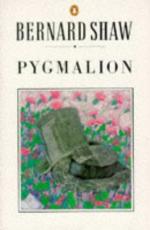|
|
Pygmalion Objects/Places
Constables: Eliza and Freddy are interrupted while embracing three times by three separate constables during their amorous night walk through the streets of London. After reprimanding them, one of the constables reflects on the vanity of romantic human hopes.
Flowers: Eliza is a professional flower girl before she meets Higgins. He will not buy flowers from her but on a whim he gives her a generous handful of money. After her studies with Higgins, she returns to selling flowers but with Freddy’s help and in shop.
Pygmalion: Pygmalion is the main character of a famous Greek myth. He is a sculptor who disdaining real women, falls in love with a statue of a women that he has sculpted. He asks Venus to give life to his statue, she grants his wish, and the statue becomes the woman, Galatea. The two fall instantly in love in the romantic conclusion of the myth. The title, Pygmalion, is only mentioned once in Shaw’s play, at the very end. Shaw says that Eliza never loved Higgins; that his Galatea never loved her creator, Pygmalion.
Ring: Higgins buys Eliza a ring, which she gives back to him as an insult. He is upset and hurls the ring into the fire. After he leaves, she retrieves the ring from the fireplace, but then casts it into the chocolate dish.
Chocolates: Higgins loves chocolates. He has a dish of them displayed prominently in his study. When trying to convince Eliza to play along with his bet, he lures her with promises of endless chocolates and just as she is about to reply to him he pops one in her mouth, silencing her. Eliza leaves a sentimental ring given to her by Higgins in the chocolate dish before leaving his house.
Slippers: Higgins often misplaces his slippers. Eliza gets into the habit of finding them for him. This saves him some annoyance, but he is not particularly grateful. In a fit of unappreciated desperation, Eliza throws the slippers at him on the final night before her departure.
Cabbage Leaf: Higgins repeatedly refers to Eliza as a bruised cabbage leaf. After he recreates her, he no longer uses the term.
Milton: Higgins speaks of Milton as if he were God in various instances in the book. He tells Eliza on their first meeting that she has no right to live because she has massacred the language of Milton. Later in the play, he comments that he has wasted the treasures of his Miltonic mind on Eliza.




